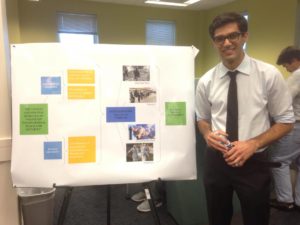
Fatah is one of the 2017 Summer Scholars, a group of students selected to carry out their own research project with a faculty mentor over the summer. A senior majoring in International Relations, Fatah’s research project is titled: “United Nations and Global Governance”. He worked with Dr. Andreea Mihalache-O’Keef to complete his project.
“The focus of my paper is to analyze the role of the United Nations with regards to how it deals with contemporary “security threats” such as ongoing intra-state wars, trans-national terrorism, environmental catastrophes, pandemics, and so on. “Security threats” is in quotes because the nature of these threats, as well as what should be done about them, is interpreted differently by the members of the United Nations and by international experts. The approach of my paper is from a human security standpoint (considering the security of the world’s populations and prioritizing it over the security of nation-states) and it suggests, rather cautiously, that if the United Nations is to have more control over its surroundings (as necessary, given trans-nationalization of these threats), rather than the reverse, its member states need to transfer more loyalty, authority, and legitimacy to it. With this project, I intended to learn how the United Nations could be reformed or made more effective in trying to alleviate human suffering and promoting human prosperity”.
Fatah first became interested in his project during the Washington semester program where he did research on the involvement of Iranian-backed militias fighting in Syria.
“The role of UN Security Council has been virtually irrelevant in Syria, since many resolutions that have tried to reduce the scale of horrors happening in Syria have been vetoed by the veto-holding members of the Security Council (United States, Russia, China, France, and Britain); particularly by either the United States or Russia. The role of regional actors is devastating too. Iran, Saudi Arabia, Turkey, Israel, as well as several non-state actors like ISIS, al-Qaeda, etc. carry out their own agendas and are highly detrimental to the population in Syria. Syria presents a very ugly picture, but is a great example of how a more sovereign United Nations could have been more helpful in reducing the scale of suffering happening there”.
Fatah enjoyed working with Dr. Andreea Mihalache-O’Keef. She encouraged him to present his research at the ISA-South conference in Orlando on October 20th-21st
“I presented my Summer Scholars paper in a panel called “Mobilization,” which was chaired by my Summer Scholars advisor Dr. O’Keef. I also attended four other panels themed “Governance,” “Environment, Health and Human Security,” “Refugees and Migration,” and “Middle East and Central Asia.” The panelists, as well as the audience, in each panel were mostly graduate students and professors, but there were some undergraduates too. It was a great learning experience and I had a chance to talk with some professors and graduate school students about my academic interests, and to get their advice as I prepare for graduate school applications”.
To anyone considering doing research, Fatah suggests to find a research question and pursue it.
“This is what I believe education is all about, to observe the nature, oneself, others, world events, and so on, and see what kinds of questions one comes across to study”.